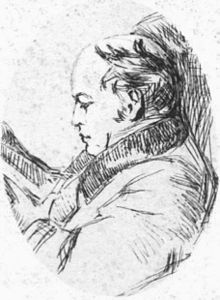Julius Mohl
| Julius von Mohl | |
|---|---|
 |
|
| Born |
25 October 1800 Stuttgart, Germany |
| Died | 4 January 1876 (aged 75) Paris |
Julius von Mohl (25 October 1800 – 4 January 1876) was a German Orientalist.
The brother of Hugo von Mohl and Robert von Mohl, he was born at Stuttgart. He abandoned the idea of entering the Lutheran ministry, and in 1823 went to Paris, at that time, under Silvestre de Sacy, the major European school of Eastern letters. From 1826 to 1833 he was nominally professor at Tübingen, but had permission to continue his studies abroad, and passed some years in London and Oxford.
He resigned his chair at Tübingen in 1834, and settled permanently in Paris. In 1844 he was nominated to the academy of inscriptions, and in 1847 he became professor of Persian at the Collège de France. But his knowledge and interest extended to all departments of Oriental learning. He served for many years as secretary, and then as president of the Société Asiatique. He died in Paris on 3 January 1876.
In 1826 he was charged by the French government with the preparation of an edition of the Shah Nameh (Livre des rois) Kings Letter By Ferdoasi Tusi The Persian epic poet, the first volume of which appeared in 1838, while the seventh and last was left unfinished at his death, being completed by Barbier de Meynard. His annual reports on Oriental science, presented to the society from 1840 to 1867, and collected after his death under the title Vingt-sept ans d'histoire des études orientales (Paris, 1879), are a history of the progress of Eastern learning during these years. Concerning the discoveries at Nineveh he wrote Lettres de M. Botta sur les découvertes à Khorsabad (1845). He also published anonymously, in conjunction with Justus Olshausen (1800–1882), Fragments relatifs à la religion de Zoroastre (Paris, 1829); Confucii Chi-king sive liber carminum, ex latina P. Lacharmi interpret atione (Stuttgart, 1830); and an edition of Y-King, Antiquissimus Sinarum liber, ex interpretatione P. Regis (Stuttgart, 1834–1839).
...
Wikipedia
